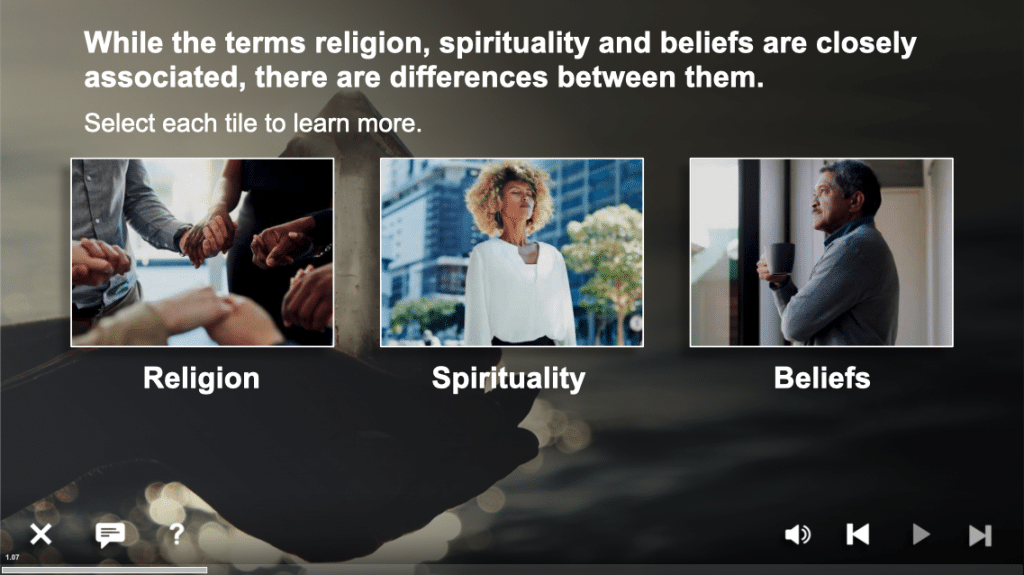
Religion, Spirituality and Beliefs
Lead your employees in welcoming diversity, building unity, and fostering trust within your teams. When everyone feels comfortable expressing their identity and beliefs, they help businesses succeed and advance together.
Course description
This training provides an overview of religion, spirituality and beliefs in the workplace and its associated positive effects. Available in versions for employees (10-min) and managers (15-min), the training explores different aspects of religion, spirituality and beliefs in the workplace and provides practical tips for making the workplace more inclusive of religious and spiritual expression.
ONLINE TRAINING
Religion, Spirituality and Beliefs

Topics include:
- The difference between religion, spirituality and beliefs
- Benefits of religious and spiritual expression in the workplace
- Religious discrimination
- Examples of religious accommodations
- Inclusive actions
KEY FEATURES
Why you'll love our training
It’s time to embrace a new era of online training with a valued partner who will ensure seamless implementation, along with a learning experience your employees will truly enjoy.
Course administration
Traliant makes it simple to roll out training to your workplace and provide technical support directly to your employees at no additional cost.
Course customizations
Tailor courses to include your logo, relevant policies, workplace images, and more. Traliant can even customize the course with scenarios that take place in your own workplace environment.
Translations
Training is available in English, Spanish and is supported in over 100 languages.
What to consider when choosing the most effective religion, spirituality and beliefs training

- Create a more inclusive workplace: Training helps to foster a culture where everyone feels comfortable expressing their beliefs and where diverse perspectives are welcomed and respected.
- Promote positive relationships: It helps to build stronger relationships among colleagues by promoting understanding and appreciation for different perspectives.
- Enhance employee morale and engagement: Employees who feel valued and respected are more likely to be engaged in their work and to contribute to the success of the organization.
- Empower employees: Training provides employees with the knowledge they need to understand and appreciate different religious and spiritual perspectives.
- Strengthen your organization's commitment to a diverse and inclusive workplace: Training helps to demonstrate the company's commitment to creating a workplace where everyone feels included.
- Reduce the risk of discrimination and harassment: Training can help to reduce the risk of discrimination and harassment by promoting understanding and respect for different religious and spiritual beliefs.
- Religion: Religion is a set of beliefs, practices, and rituals that are typically organized around a shared set of principles or teachings. Religious beliefs often involve a belief in a higher power, a code of ethics, and a sense of community.
- Spirituality: Spirituality is a more personal and individual experience of seeking meaning and connection to something greater than oneself. Spiritual practices often involve meditation, prayer, or contemplation.
- Beliefs: Beliefs are the ideas and convictions that people hold about the world and their place in it. Beliefs can be influenced by religion, spirituality, culture, or personal experiences.
- Increased employee morale: Employees who feel comfortable expressing their beliefs may have higher morale and job satisfaction.
- Greater sense of community: When employees are allowed to express their beliefs, it can create a sense of community and belonging in the workplace.
- Improved creativity and innovation: Diverse perspectives and beliefs can lead to more creative problem-solving and innovative thinking.








